Maximising Downsizer:
A Strategy to Boost your Retirement Savings
The Downsizer Contribution enables individuals to contribute additional money into super after selling their family home.
Eligibility
You are eligible to make a downsizer contribution if you meet the following conditions:
- You have reached the eligible age:
- From 1 January 2023 – 55 years or older
- From 1 July 2022 – 60 years or older
- From 1 July 2018 – 65 years or older
- Your home was owned by you or your spouse for 10 years or more prior to sale (generally calculated from settlement of purchase to settlement of sale);
- Your home is in Australia (and is not a caravan, houseboat or other mobile home);
- The capital gain/loss on sale would be exempt (or partially exempt) under the CGT main residence exemption;
- You have not previously made a downsizer contribution.
How do I make the contribution?
If you meet the above conditions and can make a downsizer contribution, to make the contribution, you must:
- Provide your superfund with a Downsizer contribution into super form before or at the time of making the contribution (if you make multiple contributions, you must provide a form for each contribution – up to the maximum contribution limit of $300,000);
- Make the contribution within 90 days of receiving the proceeds of the sale (this is generally the settlement date).
How much can I contribute as a downsizer contribution?
You can make a downsizer contribution up to a maximum of $300,000 (each spouse) but the contribution can’t be greater than the total proceeds from the sale of your home.
How does a downsizer contribution differ to other types of super contributions?
The contribution doesn’t count towards any of the contribution caps (so these caps will still be available to you).
The downsizer contributions will count towards your transfer balance cap. This cap will be considered when determining eligibility for the age pension.
If I’m eligibility, should I make a contribution to super as a downsizer contribution?
This is a good question, and one that we are often asked as accountants. Unfortunately, the question of should you make this contribution is one that a financial planner needs to answer for you. As an accountant, we can give you the facts about whether or not you are eligible and the limits on what you are able to contribute. However, we cannot advise whether you should do so. We work closely with several financial planners and we can put you in touch with these planners. They can provide you with holistic advice for your financial position and whether or not a downsizer contribution is right for you.
What should I do next?
If you are over the relevant age to make the downsizer contribution and you are thinking of selling your home, give us a call or book in a meeting to talk about your eligibility.
DISCLAIMER: The information in this article is general in nature and is not a substitute for professional advice. Accordingly, neither TJN Accountants nor any member or employee of TJN Accountants accepts any responsibility for any loss, however caused, as a result of reliance on this general information. We recommend that our formal advice be sought before acting in any of the areas. The article is issued as a helpful guide to clients and for their private information. Therefore it should be regarded as confidential and not be made available to any person without our consent.

Jeanette has over 20 years experience as an accountant in public practice. She is a Chartered Accountant, registered tax agent and accredited SMSF Association advisor. When she is not helping business owners grow their empires, you will likely find her out running on the trails or at the gym. Book in to see Jeanette today.




